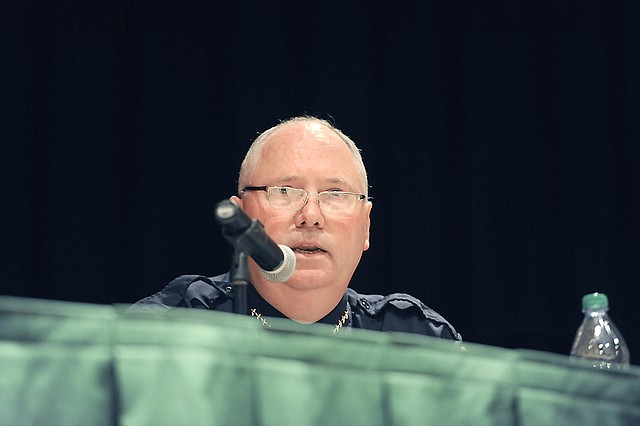Summit takes aim at Chattanooga's gun violence
Thursday, May 19, 2011
BY THE NUMBERS2009* 19 - Homicides* 70 - Shootings, with 84 victims* 63 - Percentage of homicides that involved firearms* 4 - Domestic-related cases* 9 - Gang-related cases2010* 20 - Homicides* 54 - Shootings, with 67 victims* 70 - Percentage of homicides that involved firearms* 2 - Domestic-related cases* 11 - Gang-related cases.2011* 10 - Homicides* 27 - Shootings, with 32 victims* 78 - Percentage of homicides that involved firearmsSource: Chattanooga Police Department
So far this year in Chattanooga, an Eastside Elementary School third-grader brought a loaded .32-caliber revolver to class.
A Chattanooga Police Department sergeant was gunned down during a robbery call.
Ten of the 11 homicides victims countywide died from gunshot wounds.
All of that needs to be discussed openly, not only by law enforcement and government officials, but by everyone in the community, officials say.
"This is conversation, no matter how uncomfortable, no matter how politically hot, it's a conversation that we should be having in this community," Chattanooga Mayor Ron Littlefield said Wednesday at an anti-violence gun summit at the University of Tennessee at Chattanooga.
"We should be talking about guns because, when you boil it all down and talk about the incidents that have occurred, guns are in the middle of it," he said.
As part of a gun violence summit hosted by the city, Paul Helmke, the CEO of the Brady Campaign - which touts itself as the nation's largest organization working to prevent gun violence - spoke to a small crowd Wednesday at UTC, advocating tougher gun laws and responsible gun ownership.
Citing statistics from the Centers for Disease Control and Prevention, he said 32 people are slain daily in America with guns - the same number of people killed in the Virginia Tech shootings in 2007.
"A Virginia Tech happens every day in this country," he said.
The CDC numbers grow to 85 if suicides and accidental deaths are included, he said.
One of Helmke's main issues is the lack of laws regulating sales of guns by private individuals, something that often happens at gun shows. Under federal law - the so-called Brady bill - brick-and-mortar gun dealers must run background checks on everyone who buys a gun, he said, but dealers at gun shows are considered private and don't have to run such checks.
"If we all agree - if we're gun owners, NRA members, whatever - that felons shouldn't be able to get guns, people who are mentally ill shouldn't get guns, then we should require a background check basically on all sales," Helmke said. "The person that killed the (Chattanooga) police officer in April got his gun at a gun show where he didn't have to go through a background check."
Jesse Mathews, who is accused of killing Chattanooga police Sgt. Tim Chapin during a robbery call on April 2, traded stolen guns from Colorado at a local gun show for the weapon he later used to kill Chapin, police say.
Rachel Parsons, spokeswoman for the National Rifle Association, cited a Department of Justice study stating that less than 2 percent of guns purchased at gun shows are used in crimes. She said a vast majority of people who sell firearms at the gun shows are licensed dealers - not private sellers.
Helmke said people should lobby their legislators to pass laws that would require background checks for the sale of every gun, whether it's in a store or a gun show.
Parsons said "any piece of legislation would be written so overbroad it would make it illegal for a grandfather to give his grandson a gun without inviting the federal government into it."
Sufficient gun laws already are on the books and should simply be enforced, she said.
Aside from tougher laws, Helmke said police departments should be strengthened in terms of resources, and civilian access should be limited for high-powered weapons with high-capacity clips.
The Tucson, Ariz., man accused of killing six people and grievously wounding U.S. Rep. Gabrielle Giffords and 11 others in January had a weapon with an expanded 31-round clip, Helmke noted.
Since then, federal legislation has been filed to outlaw civilian access to such high-capacity ammunition magazines and high-powered assault rifles, he said.
"We've been seeing more of the assault weapons, more of these assault clips, and we get tragedies like Tucson, where someone can get 31 shots off in 15 seconds," he said.
Parsons disagreed and said law-abiding citizens use the assault rifles for a variety of reasons such as sports shooting or self-defense against multiple assailants.
"You want to have the best and most powerful firepower for yourself," she said. "We're talking about lawful people. It's not the magazine - it's the criminal."
Chattanooga Police Chief Bobby Dodd said traces are run on all guns that are confiscated by the department to see if the guns are stolen or have been used in previous crimes.
"We track every gun no matter if it's confiscated or turned in," he said.
In 2008, police seized 579 weapons, he said, while 682 weapons were picked up in 2009 and 589 weapons collected in 2010.
Helmke and other officials at Wednesday's summit said they're not against responsible gun ownership, and said dealing with gun violence is not a Second Amendment issue.
"We're not talking about gun control as people think of gun control. We're talking about gun responsibility," Littlefield said.
Helmke noted that, even if most of a city's gun violence is happening in specific neighborhoods, the ripple effects are destructive to the entire community.
"People say it's not my problem, it's not my part of town, it's not my issue," he said.
